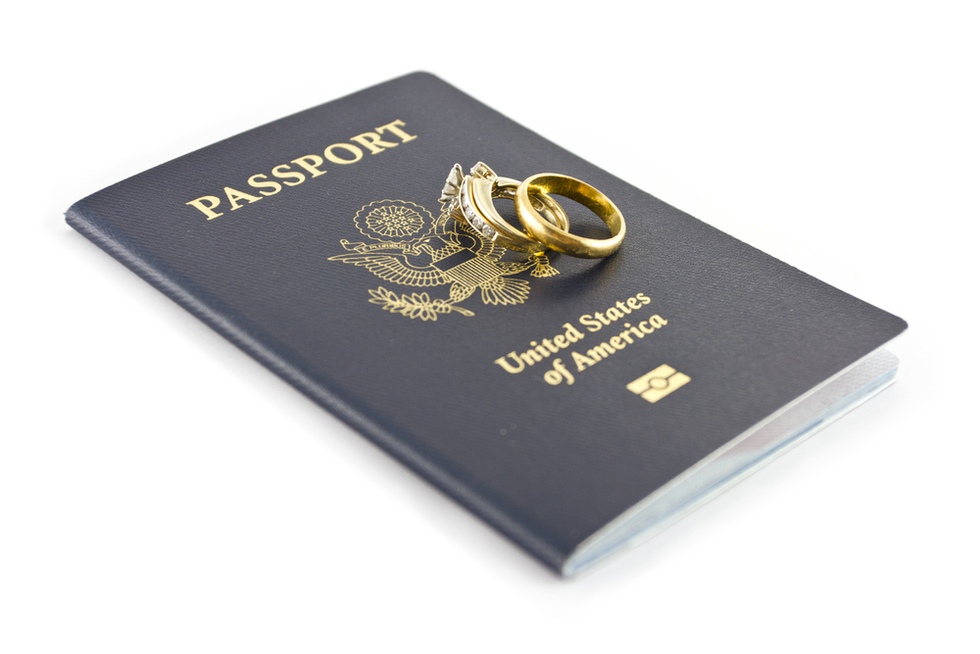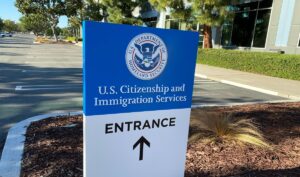
When immigrating to the United States through a spousal relationship, it’s essential to prove your marriage is real. Thus, it’s important to understand how the U.S. government determines if you have a valid marriage for immigration purposes. Because certain permanent residents may become U.S. citizens in just three years if married to a U.S. citizen, a bona fide marriage is also vital in these naturalization cases. This article takes a closer look at marriage immigration law and policies from U.S. Citizenship and Immigration Services (USCIS).
Is my marriage recognized for U.S. immigration purposes?
Are there types of marriages that U.S. immigration law does not recognize?
What are the requirements for my previous marriage?
Will USCIS recognized my same-sex marriage?
Are marriages performed online valid for immigration?
Will the U.S. recognize our religious marriage?
Is common law marriage valid?
Do I need to prove that I have a valid marriage for immigration purposes?
How can I get help?
Marriage Types USCIS Recognizes as Valid
The location of the marriage, status of past marriages, type of marriage, and who performed the marriage are all factors that affect the validity of your marriage. The most fundamental rule is that your marriage must be valid in the place where the marriage was celebrated. Under the “place-of-celebration rule,” USCIS generally considers a marriage valid for immigration purposes if the marriage was valid under the law of the jurisdiction in which it was performed. The location may be the United States or abroad. Many exceptions and distinctions are explained below.
Marriage Types USCIS Will Not Recognize
But wait! There are situations that USCIS does not recognize marriages, even if they are valid in the place of celebration. Types of marriages that USCIS may not consider valid for immigration purposes include:
- Polygamous marriages;
- Certain marriages that violate the strong public policy of the state of residence of the couple;
- Civil unions, domestic partnerships, or other such relationships not recognized as marriages in the place of celebration;
- Relationships where one party is not present during the marriage ceremony (proxy marriages) unless the marriage has been consummated; or
- Relationships entered into for purposes of evading immigration laws of the United States.
People with Previous Marriages
If you were married to another person prior to your current marriage, you must be able to prove that all prior marriages ended before your current marriage. A marriage can end through death, divorce or annulment.
Death of a Previous Spouse
If your previous marriage ended through the death of that spouse, you’ll need to show evidence that the death occurred before your current marriage began. Typically, a death certificate is sufficient proof.
Divorce or Annulment
Your marital status may be terminated by a judicial divorce or by an annulment. A divorce or annulment breaks the marital relationship. You’ll need to show that the divorce or annulment was finalized before marrying your current spouse. Generally, applicants may use a divorce decree or annulment decree as evidence the marriage ended before the marriage date on a marriage certificate. This document may also be issued as a court judgement called a Final Judgment of the Dissolution of Marriage.
The validity of a divorce outside the U.S. depends on the interpretation of the divorce laws of the foreign country that granted the divorce and the reciprocity laws in the state of the United States where the applicant remarried. If the divorce is not final under the foreign law, the current marriage is not valid for immigration purposes.
Same-Sex Marriages
A 2013 United States Supreme Court decision (United States v Windsor) clarified the definition of marriage to include marriages with two persons of the same sex. Therefore, USCIS determines the validity of a same-sex marriage by the place-of-celebration rule, just as they do for an opposite-sex marriage. Under the law, same-sex marriages are treated identically.
If the state of residence has a public policy refusing to recognize same-sex marriage, this will not result in a same-sex marriage being considered invalid for immigration purposes if it is valid in the place of celebration. In other words, it is acceptable for the couple to travel to a country and wed where same-sex marriages are legal.
Proxy Marriages or Online Ceremonies
Proxy marriages occur when one member of the couple isn’t physically present for the marriage. Generally, another person takes their place where the ceremony is held. Typically, the officiant is in the place where the ceremony is held.
Online marriages may be performed when the bride and groom aren't able to be together for the ceremony. Particularly for people with long-distance relationships, it is becoming more commonplace to perform weddings via Zoom, Facebook or other web-based platforms.
USCIS will only recognize proxy marriages if the marriage is consummated. In other words, the couple must have had sexual relations after the marriage took place. This is an important distinction, because consummation prior to the marriage does not meet the criteria. Therefore, it's necessary for the couple to prove they've been in the same physical space (even days or weeks) after the marriage ceremony.
Religious or Traditional Marriages
Religious, traditional or customary marriages can be valid for U.S. immigration if they are legally recognized in the country where the ceremony took place. In other words, a marriage performed with the traditional practices or a religion or the customs of an ethnic tradition may be valid, even it if was not officially registered with civil authorities. Couples should verify local legal requirements to ensure their marriage is valid. If the ceremony isn’t recognized, the couple may need to register the marriage with civil authorities or hold a legally recognized ceremony to meet U.S. immigration standards. This ensures that USCIS will accept the marriage for visa or green card purposes.
How to Determine if Your Marriage Ceremony is Recognized by the U.S.
To determine if your marriage is valid for immigration purposes, you'll need to do some research. Although this may be something you can do yourself, individuals should seek legal assistance for the best results. The local laws, not the religious or cultural customs, will determine whether the marriage is valid. Couples should ensure they meet civil marriage requirements in their country of residence before proceeding with a traditional ceremony.
You can use the U.S. Department of State's Reciprocity Tables to help make this determination.
How to Proceed if Your Traditional Ceremony is Legally Valid
When the marriage is legally valid yet no government registration occured, it is still neessary to prove you're married. For example, customary marriages are legally binding in Nigeria, but no registration or written record of the event is required by law. As a result, documentation of customary marriages generally does not exist outside of photographs taken at the ceremony. Individuals will sometimes, when necessary, swear an affidavit in a court that they are married in order to provide written proof of such a marriage. Again, speak to an immigration attorney to address your specific situation so that you can document your marriage properly.
How to Proceed if Your Ceremony is Not Valid for U.S. Immigration
If your religious or traditional marriage is not recognized legally, you may need to register your marriage with local civil authorities. Alternatively, you could hold a new, legally recognized ceremony to meet U.S. immigration standards.
Common Law Marriages
USCIS will generally recognize common law marriages if the marriage was valid and recognized by the state in which the marriage was established.
In order for a common law marriage to be valid for immigration purposes:
- The couple must live in that jurisdiction that recognizes common law marriages and considers the couple to be married; and
- The couple must meet the qualifications for common law marriage for that jurisdiction.
This can be complicated territory. If you have a common law marriage and want to know it’s validity for the purposes of immigration, it’s best to have an immigration attorney analyze your specific situation.
A Marriage is More Than a Certificate
Depending on the specific immigration benefit you are requesting, USCIS will evaluate your marriage differently. A valid marriage for the purposes of obtaining a green card is slightly different than marriage validity for U.S. citizenship. Either way, you must be able to show that your marriage is genuine.
When preparing your USCIS application, CitizenPath can help you satisfy these requirements. CitizenPath’s affordable, online immigration service makes preparing the forms easy. You’ll also get customized filing instructions based on your answers. Our instructions will explain exactly which supporting documents to submit with your application. Learn more >
Valid Marriage for a Green Card
When applying for a green card based on marriage to a U.S. citizen or permanent resident, you’ll need to submit proof that you have a “bona fide marriage.” In other words, USCIS wants to see evidence that demonstrates you have a real relationship and intend to build a future together. It’s more substantial than just a marriage certificate. The relationship must be based on more than acquiring a green card.
Marriage Validity for Naturalization
When permanent residents apply for U.S. citizenship based on marriage to a U.S. citizen, it’s necessary to demonstrate that the couple is married and “living in marital union.” In fact, the applicant must live in marital union with their citizen spouse for at least three years immediately preceding the date of filing the naturalization application (Form N-400). They must continue to live in marital union up until the applicant takes the oath ceremony. USCIS considers an applicant to live in marital union with their citizen spouse if the applicant and the citizen actually reside together.
A separation, legal or informal, will likely sever this marital union requirement for naturalization. A separation could also invalidate a qualifying relationship for a pending green card application. Therefore, it’s important to consult with an immigration attorney if you have a pending application and your relationship with a spouse is deteriorating.
CitizenPath Makes Marriage-Based Immigration Easier
CitizenPath provides simple, affordable, step-by-step guidance through USCIS immigration applications. Individuals, attorneys and non-profits use the service on desktop or mobile device to prepare immigration forms accurately, avoiding costly delays. In addition to providing you with ready-to-file forms, CitizenPath furnishes you with a set of personalized filing instructions. You'll get a detailed checklist of supporting documents, directions on how to organize your application, and where to mail it. CitizenPath allows users to try the service for free and provides a 100% money-back guarantee that USCIS will approve the application or petition. We provide support for the Immigrant Visa Petition Package (Form I-130), Adjustment of Status Package (Form I-485), and several other immigration services.
Want more immigration tips and how-to information for your family?
Sign up for CitizenPath’s FREE immigration newsletter and
SAVE 10%
on our immigration services







